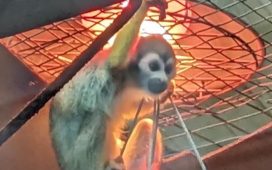Australia’s major political parties are facing calls to explain what role they will play in securing a global deal to save nature and the human populations reliant on it after a major scientific report warned a million species across the world face extinction.
The first-of-its-kind assessment by an international scientific panel convened by the United Nations, known as the Intergovernmental Science-Policy Platform on Biodiversity and Ecosystem Services, warns species are declining at a rate unprecedented in human history, with three-quarters of land-based environments and two-thirds of the marine environment significantly altered.
Compiled by 450 scientists and diplomats over three years, the assessment says accelerating species extinction is likely to have significant implications for humans and urgent systemic change is needed to reverse the decline and restore lost ecosystems.
With countries to meet in Kunming, China next year to set targets as part of the global convention on biological diversity scientists and environment groups urged the next Australian government to take a lead.
The Australian Conservation Foundation’s nature program manager, Basha Stasak, said Australia, as a developed nation with mega-diverse native life, should be at the forefront of the push for a meaningful deal.
She said the report made clear protecting species and landscapes would require fundamental change, including increasing funding to the national environmental budget – down more than a third since 2013 – and reversing the loss of more than 7.4 million hectares of threatened species habitat since the national Environment Protection and Biodiversity Conservation Act was introduced 20 years ago.
She called on the next government to back measurable targets and obligations, including a goal of protecting 30% of Earth’s land and waters by 2030.
“Scientists tell us [it] is key to tackling mass wildlife extinctions and climate change,” Stasak said. “Us being in the room and pushing for a strong agreement in China, and the meetings leading up to that, is critically important. We have a unique voice that we can add to this debate and we haven’t in the past.”
The WWF conservation scientist Martin Taylor cited government data that showed Australia had the highest rate of native mammal extinction over the past 200 years, having lost 27 species. It is the only developed country on a list of 11 global deforestation hotspots.
He said Labor’s election commitments, including new national environmental laws, a federal environment protection authority and a native species protection fund, were welcome promises but at this stage no more than that.
“It doesn’t seem to have hit home, the state of emergency we’re facing,” he said. “We’ve got school kids on strike and the UK parliament has just declared a state of emergency but we’re still waiting for a sign that the Canberra bubble has popped and that they are facing the real world for a change. The real world is looking very, very serious indeed.”
Martine Maron, a professor of environment management at the University of Queensland, said halting the decline of species and ecosystems would not be enough. She gave an example from a recent peer-reviewed paper: most birds in south-east Australia have already lost most of their habitat.
“We need a commitment bigger than just slowing the rate of loss. We need to turn it around and recover ecosystems,” Maron said. “And we need to remember that biodiversity is not just about birds and mammals but also about all the small things, the less charismatic species, that contribute to a functioning global ecosystem.
“I don’t know how much that is embraced by political parties, but I think it is important for the public to understand what we are taking to the convention on biological diversity as part of the public debate.”
Richard Kingsford, the director of the Centre for Ecosystem Science at UNSW, said Australia was doing even less to prevent the loss of biodiversity than it was to address climate change.
“We are still doing things to drive down biodiversity when we should know better,” he said, citing the examples of recent mass fish kills at the Menindee lakes and a global decline in insect numbers.
“A lot of our decisions are made based on jobs and export dollars, but we are not looking at the long-term costs of what we’re doing. We know that but we’re still making the same mistakes. We’re passing off the economic costs to future generations.”














